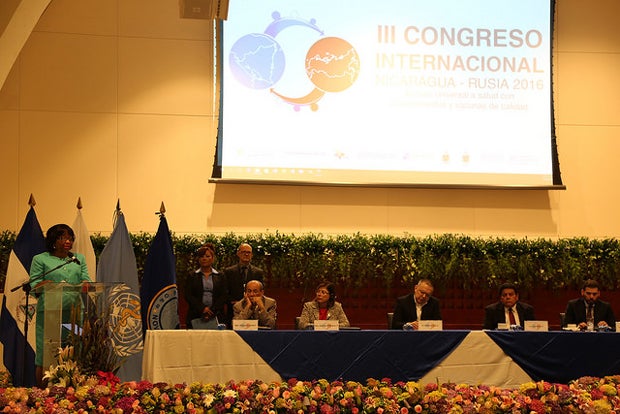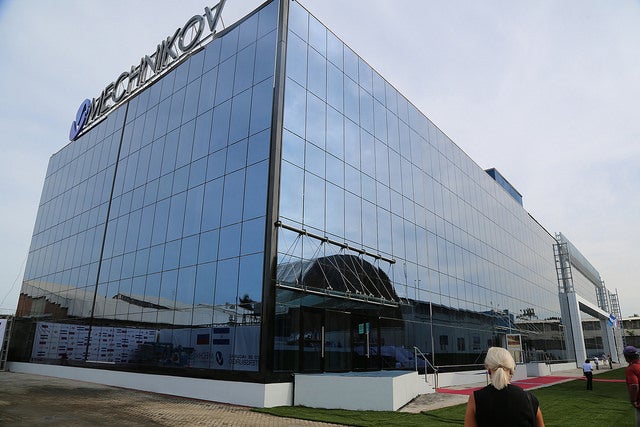

Expanding access to quality medicines and health technologies, including vaccines, is critical it countries are to advance toward universal health, experts from Nicaragua, Russia and the Pan American Health Organization/World Health Organization (PAHO/WHO) said during the III International Nicaragua-Russia Congress, which took place last week in Managua, Nicaragua.
Managua, Nicaragua, 27 October 2016 (PAHO/WHO) - Expanding access to quality medicines and health technologies, including vaccines, is critical it countries are to advance toward universal health, experts from Nicaragua, Russia and the Pan American Health Organization/World Health Organization (PAHO/WHO) said during the III International Nicaragua-Russia Congress, which took place last week in Managua, Nicaragua.
The meeting was convened to facilitate the exchange of scientific knowledge and to build capacity in three key areas: vaccine production, the use of herbal medicines in health care, and arboviral diseases (including Zika, dengue, and chikungunya). The meeting was organized as part of a cooperation initiative for technology transfer between Russia and Nicaragua, which also included the construction of a new vaccine production plant that opened in Managua on the same day as the conference (Oct. 22).
"Access to safe, high-quality and cost-effective medicines is essential for achieving universal health," said PAHO Director Carissa F. Etienne.
Etienne said that universal health-defined as ensuring that all people receive the health care they need when they need it, without fear of financial difficulties-is a critical component of the new United Nations sustainable development agenda, which was adopted by UN member countries last year. Expand accessing to medicines and health technologies is also a key component of PAHO/WHO's strategy to support its member countries in expanding health access and coverage for their populations."One of the challenges is equitable access to the vaccines that are needed to protect y promote health," said Etienne, adding that the new Mechnikov vaccine production plant is an example of what can be achieved through innovative partnerships. The plant was cofinanced by Russia and Nicaragua and is receiving technical support from PAHO.

Etienne noted that the Region of the Americas has been a world leader in using vaccines as a highly cost-effective technology for controlling and eliminating vaccine-preventable diseases. The Americas region just last month was formally certified as the first in the world to have eliminated measles-the fifth vaccine-preventable disease to be eliminated from the region.
Capacity building in Nicaragua
Nicaragua's deputy foreign minister for Eastern Europe and Central Asia, Luis Molina Cuadra, said the technology-transfer agreement between Nicaragua and Russia that supported the new Mechnikov vaccine production plant also includes capacity building for Nicaraguan health professionals.
"A healthy population is a strong population, and a strong population is one that develops," said Cuadra, adding that the new plant is expected to produce some 15 million flu shots every year along with other vaccines and immunobiological products.
Victor Trukhin, director of serum and vaccine research at the St. Petersburg Institute, said the plant will help ensure universal access to quality vaccines for the Nicaraguan population and throughout the region, and that his institution will continue to strengthen the capacities of Nicaragua human resources to ensure the plant's smooth operation.

In closing the conference, Minister of Health of Russia Veronica Skvortsova said that "vaccination is a fundamental technology" for health and that universal immunization is one of his country's top priorities. "Our task is to make available to everyone not just quality medicine but medicine of the highest quality, based on our scientific knowledge."
James Fitzgerald, director of PAHO/WHO's Health Systems and Services department, noted that improving access to medicines and innovation also "requires strengthening the regulatory capacity of countries, in order to ensure product quality." He added that pooled procurement of essential drugs and vaccines, which is the function performed by PAHO's Strategic Fund and Revolving Fund, can improve countries' purchasing power by strengthening demand and achieving price reductions, while also ensuring quality and safety.
Other subjects discussed during the meeting focused on the impact of arboviral diseases; the scientific basis for drug registration; research, development and production of vaccines for arboviral diseases; and technologies for producing these vaccines.



